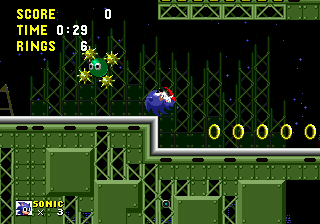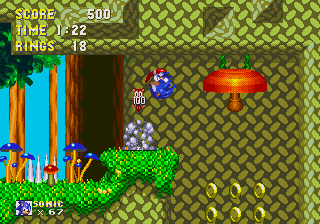Spin Attack
From Sonic Retro
(Redirected from Spin attack)
- For the move introduced in Sonic the Hedgehog 2, see Spin Dash.

|
This article needs a complete rewrite for the reasons listed on the talk page. You can help Sonic Retro by fixing it. After fixing this article, please remove this notice. |
| Spin Attack |
|---|
| First seen: Sonic the Hedgehog (1991) |
| Users: Sonic the Hedgehog, Miles "Tails" Prower, Knuckles the Echidna, Amy Rose, Mighty the Armadillo, Ray the Flying Squirrel, Metal Sonic, Shadow the Hedgehog |
| Type: Attack |
The Spin Attack (スピンアタック) is a signature manoeuvre of Sonic the Hedgehog and many of his allies, allowing characters to curl into a ball and attack enemies or objects. Hedgehogs naturally roll up into a ball to fend off predators - the Spin Attack is much the same, but as the character "spins", he or she is able to keep moving.
Almost all Sonic the Hedgehog video games involve some form of Spin Attack.
Contents
Types
In Western lore, variants of the Spin Attack name has been used to describe two moves - "rolling" and "jumping". Japan initially made a distinction between the two as Kaiten (回転) and Kaiten Jump (回転ジャンプ), respectively, but adopted the Spin Attack name with the 1998 release of Sonic Adventure.
While both states typically have the same affect on enemies, 2D Sonic games often have breakable walls that can only be overcome through rolling. Both moves are treated as offensive strategies - they do not make their peformer invulnerable from dangers such as enemy projectiles or spikes, but are usually the means in which enemies and bosses are defeated.
Moves introduced later in the series, such as the Spin Dash and Homing Attack can transition to and from a Spin Attack.
Description
The spin attack is an offensive or defensive maneuver. It can be used to attack or preempt enemies, or even to break certain walls. The theory behind this behavior is that when Sonic performs the move, he rolls up into a ball, causing his spines to be exposed. These spines combined with his intertia and momentum is what causes the enemies to take damage. Enemies that utilize spikes, flame, extreme cold, etc. counteract the spin jump and cause damage to the character performing it.
When Tails was introduced in Sonic 2, he too was able to perform the move, even though he has no spines. Knuckles's introduction in Sonic 3, and his ability to perform the move as well, set a precedent that the move is a standard offensive for characters in the Sonic universe.
Other characters such as Cream, Mighty, Ray, Rouge, Shadow and Vector are able to perform the move, whereas others like Espio have similar but different offensive abilities, and still others such as Amy (before Sonic Advance 2, armed with a large hammer to compensate) and Eggman (who generally uses various machines to attack) were shown to jump without spinning.
The roll and the jump are sometimes referred to separately:
Spin roll
In most 2D Sonic games, simply press ![]() while in motion (a minimum velocity is required) to cause the character to roll into a ball. While the character would normally be harmed by touching enemies, if the character is spinning while touching them, most enemies would be destroyed, though some are shielded against the ability, or can harm the player otherwise. The spin roll is distinct from the charge-up spin dash move, although a spin dash evolves into a particularly high-velocity spin roll.
while in motion (a minimum velocity is required) to cause the character to roll into a ball. While the character would normally be harmed by touching enemies, if the character is spinning while touching them, most enemies would be destroyed, though some are shielded against the ability, or can harm the player otherwise. The spin roll is distinct from the charge-up spin dash move, although a spin dash evolves into a particularly high-velocity spin roll.
In the 3D games, a non-directional button is assigned to this ability; please see the game's manual for details.
Spin jump
The name spin attack also refers to the ability of the character to jump and spin simultaneously. This "spin jump" is the primary offensive maneuver of Sonic and others in the games. Unlike hop-n-bopper heroes such as Mario or Diddy Kong, who must make contact with their feet in order to defeat an enemy, the spin jump enables the character performing it to roll up into a ball while jumping, causing most Badniks that come into contact with any portion of him/her to be defeated.
It is assigned 1 to 3 buttons depending on the game, and pressing the button will cause the character will jump and spin into a ball at the same time. This is the primary form of both attack and vertical movement in most Sonic games.
History
This maneuver has been known by many names over the years.
Sonic 1
The Sonic 1 instruction manual refers to it as the Super Sonic Spin Attack[1], as at the time, Sonic was the only character who could perform the ability.
This maneuver will increase Sonic's speed while traveling down declines, but will decrease his speed on level ground (as he can no longer propel himself forward, and instead relies on inertia). While in this curled-up state, Sonic's hedgehog quills are displayed prominently, allowing him to destroy most enemies by plowing through them.
In the same game the name also referred to Sonic's ability to jump, while simultaneously performing the spinning maneuver. This was his primary form of attack in the game, and can be performed by pressing the ![]() ,
, ![]() , or
, or ![]() buttons while on the ground. The longer you hold down the button, the farther up he jumps.
buttons while on the ground. The longer you hold down the button, the farther up he jumps.
Certain walls in the game can be broken by performing the spinning roll, but not the spinning jump.
Future 2D games
The two abilities from Sonic 1 appear in virtually all 2D Sonic games. Once new characters were introduced into the franchise with the same spin ability, Sonic's name was dropped from the maneuver. The word "Super" is used randomly and inconsistently, obviously used to make Sonic's trademark ability seem cooler.
In Sonic 2, the rolling was "to spin" and the jumping "to spin jump" on the initial control page, then both as the Super Spin Attack on the next page of Super Stunts; Sonic's partner, Tails, can also perform the maneuver, hence the removal of the Sonic name. Sonic 3, its sequel which introduced Knuckles into the franchise, again uses this name for both.
Sonic CD refers to the jumping as the Spin Attack on the control page, and the rolling as the Super Spin Attack on the Sonic's Super Stunts page.
Games after this generally cease referring to the move specifically. Although the ability is present in virtually all Sonic games, they often only mention the ability to jump, as well as the ability introduced in Sonic 2 known as the spin dash.
3D Games
Sonic Jam was the first time Sonic entered 3D platforming. The 3D hub for the extra features, Sonic World, armed Sonic with a jump and... well, that's pretty much it. There was no way of performing the Spin Attack on the ground. When Sonic Adventure came out for the Dreamcast in 1999, Sonic, Tails, and Knuckles were armed with both spin attacks. Jumping was performed with the ![]() button, and spinning was performed when running and pressing the
button, and spinning was performed when running and pressing the ![]() or
or ![]() buttons.
Sonic Forces also calls the attack for Classic Sonic when jumping the Spin Attack just like in Sonic CD. A pair of missions in it that involve the attack is to jump on 3 enemies in a row and then 5 in a row, the latter is after the former is completed (both missions must be done with neither time landing until after the required number of enemies are defeated).
buttons.
Sonic Forces also calls the attack for Classic Sonic when jumping the Spin Attack just like in Sonic CD. A pair of missions in it that involve the attack is to jump on 3 enemies in a row and then 5 in a row, the latter is after the former is completed (both missions must be done with neither time landing until after the required number of enemies are defeated).

